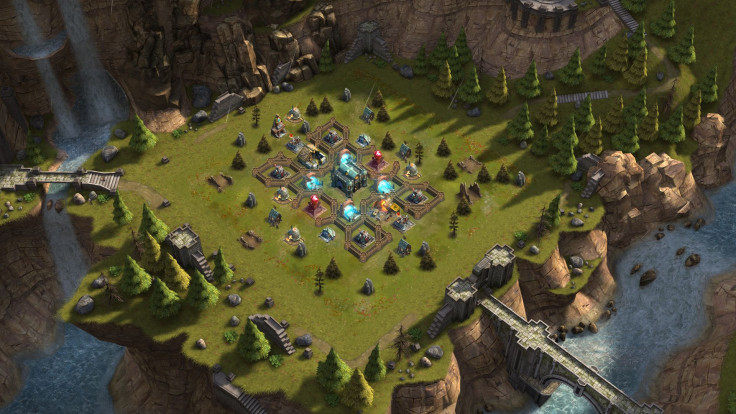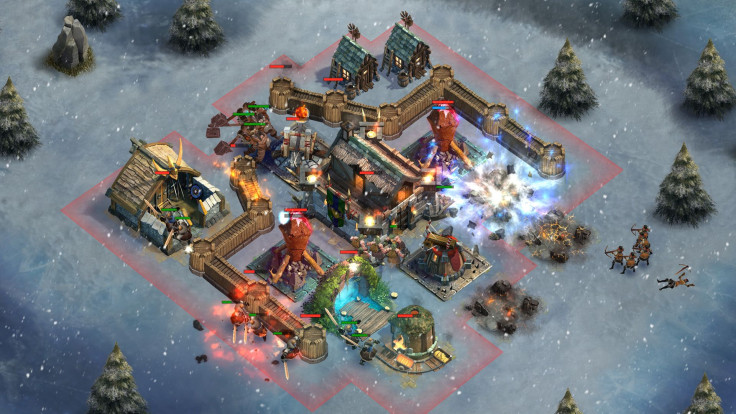Space Ape's 'Rival Kingdoms' Is That Rare Second Success In The Mobile Gaming Industry

In a world of Rovio’s "Angry Birds" and King’s "Saga" series, indie game developer Space Ape is looking to break mobile gaming’s streak of one-hit wonders with its second title, "Rival Kingdoms: Age of Ruin." The real-time strategy game with a fantasy element had a million downloads in the first week of release in May and now has almost 4 million players. This is no surprise to Space Ape: the company was planning "Rival Kingdoms'" debut even as it was working on its first full game, "Samurai Siege" in 2013.
After releasing -- then swiftly shutting down -- a real-time predictive sports game when Space Ape was founded in 2012, company execs took a different direction altogether with "Samurai Siege." The team of 18 worked on the "Clash of Clans"-like strategy game for around eight months before launching in October 2013. Within two weeks it had 1.2 million downloads and 300,000 daily active users, it now has around 14 million downloads.

“The plan for Siege was to be fast and pay the bills. So we made some smart choices to follow Clash and focus on a few key things,” said Simon Hade, one of the three Space Ape co-founders and a veteran of Electronic Arts and Skype. Siege “made us profitable as a company to the tune of $20 million a year, but we knew that we were rushing it.”
Space Ape had ideas left over from Siege because of the short turnaround, so it started working on "Rival Kingdoms" in January 2014. To do it the way they felt was right, the company employed a team twice the size of Siege’s and kept the game in development and testing for over a year. It brought in writer Rhianna Pratchett, who worked on "Tomb Raider," and composer Richard Jacques of "Mass Effect" to build the world and give it a history.

It paid off. "Rival Kingdoms" topped strategy game charts in multiple countries including the U.S. and France. The mix of classic base-building with quests, a rich storyline and characters called Ancients to aid players on their journey and against other people got the community addicted in a way that most mobile games couldn’t.
For game developers and publishers, successfully capturing and holding the attention of mobile gamers is a struggle and doing it twice is even harder. Often, developers will bring out new versions of an already popular game -- think Rovio, which has 14 different titles that feature the "Angry Birds" -- and have another one released by month’s end.
“Catching lightning in a bottle once is rare. Doing so more than once is almost as magical as what I imagine it’s like riding a unicorn,” said Joost van Dreunen, CEO of SuperData Research. Hence the multiple versions of already-popular games. (Finnish gaming company Supercell has proven to be an exception to this, having two hits with "Clash of Clans" and "HayDay.")
One reason it’s hard to follow up a blockbuster with another smash hit is that success can make game publishers conservative. “The challenge for game companies following a hit is answering the question of how to innovate without alienating your fan base. They don’t necessarily get hesitant, but rather start to mitigate risk,” said van Dreunen.
A number of gaming companies have shut down mobile titles due to lack of uptake, like Supercell’s follow-up "Smash Land," which didn’t do nearly as well as "Clash of Clans." Zynga’s "FarmVille Country" mobile game only gets around 350,000 daily active users. Compare that to "FarmVille 2," which clocked in at around 8 million a day in 2013.
Part of a game's success comes down to smart marketing, like using a celebrity for advertising, and favorable placement in the app stores, which can be a problem for startups competing with the likes of King, Rovio and Zynga. Front-office experience helps too: alongside Hade at Space Ape is John Earner who used to work at Playfish and PlayStation, and Toby Moore of Mind Candy.

For follow-up games to succeed, they also generally need a big marketing push. Almost everyone in the world has seen Kate Upton in the "Game of War" ads, with developer Machine Zone reportedly spending around $40 million on the campaign. "Game of War" has an estimated 3 million daily active users, making it a hard game to compete with for player attention in the mobile space.
Altogether Space Ape has received $11 million in funding from six investors, including Northzone, the institutional investor behind Spotify. It bolsters this with the income from "Samurai Siege" and now "Rival Kingdoms." When Space Ape first started working on "Samurai Siege" it had a team of 12 people, that grew to 18 upon launch and the company now has 95 employees.
"Rival Kingdoms" has spawned its own thriving community, there's a "Rival Kingdoms" subreddit and wiki to help gamers around the world collect Ancients and share in-game codes and strategies.
© Copyright IBTimes 2024. All rights reserved.





















